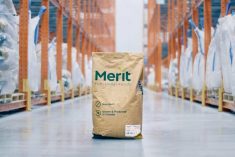The whole plant protein sector has been hit by the challenges experienced by Merit Functional Foods, but basic indicators for growth are still strong, according to the head of Protein Industries Canada (PIC). “I do believe the demand is there and is growing,” Bill Greuel, the organization’s CEO, said.
A federally funded accelerator program for the protein sector since 2018, PIC has focused its efforts on innovation and market opportunities in plant-based protein. Merit Functional Foods was among the Manitoba companies to get support from PIC in the last five years.
From what he’s seen, Greuel said, companies are still interested in building in Canada.
Read Also

Students push for Manitoba road upgrades
Manitoba’s lack of higher-rated RTAC roads creates irritating highway detours and weight restrictions for farmers, University of Manitoba students told KAP.
“I think they’re really taking a good hard look, and making sure they have very good mitigation strategies for all of those risks, but still looking to Canada as a place for investment because of access to raw material and the other ecosystem benefits that we have,” he said.
Merit Functional Foods has been an often-cited example of Manitoba’s growing plant-protein sector, making its recently announced financial issues all the more jarring.
Merit Functional Foods, a Winnipeg-based pea and canola protein processor, announced it was going into receivership in late February. Vancouver-based protein firm Burcon NutraScience, which has a nearly 32 per cent stake in Merit, has signalled intentions to acquire the business.
“This is tough,” Merit co-CEO Ryan Bracken wrote in a statement posted to LinkedIn on March 1. “While our proteins have been formulated into countless products globally, we couldn’t get to the level of cashflow [sic] needed to operate the business profitably, quick enough.”
Bracken cited pandemic-related challenges like border closures, customer research and development labs shuttering and global stops on new product development. Economic factors like rising interest rates, doubling of raw material costs and reduced risk appetite from lenders and investors also played a factor.
Many of these issues are sector-wide challenges, Greuel said. Everyone is up against the cost of raw materials. Others, however—like interest rates—depend on the ownership structure of the company and its debt load, he added.
The number and degree to which Merit faced these issues was the concern, according to Greuel.
Globally, alternative protein investment declined sharply in 2022, following a peak the year before. There was a record investment of $5.1 billion in 2021, but last year saw $2.9 billion, according to a Feb. 23 report from the Good Food Institute.
“It appears that the deceleration of alternative protein funding in 2022 was in line with broad funding declines as global private funding declined by 35 percent,” the report said.
Space for gains
Some categories of alternative proteins saw gains in 2022, the report added. Several companies launched plant-based versions of branded products and quick-service restaurants saw a resurgence in plant-based menu launches.
“There’s still a lot of demand,” Greuel said.
Some plant-based proteins have seen slowing sales, he acknowledged, citing alternative meat products like Beyond Meat. Other categories like dairy alternatives and egg replacements are growing significantly however.
Bump, a consumer product line that blends meat and plant protein, is hitting its stride, according to Juno Food Labs founder James Battershill. The Winnipeg-based company developed Bump.
“Our growth has been a little bit slower, but has been much steadier, I think. And we’re still growing,” he said.
Some material costs have risen, but the cooling market for plant-based meat alternatives and excess processing capacity have led to more competitive prices on other materials, Battershill said.
PIC funds refuelled
Protein Industries Canada pumped nearly $13.5 million into Merit Functional Food’s development, but Greuel maintains that the company’s financial woes aren’t a loss for PIC.
“Certainly, it’s a very unfortunate situation at Merit, but the knowledge that they would have gained from our investments is still there,” he said.
PIC’s role is to “de-risk and accelerate the pace of innovation in the plant-based food, feed and ingredient sector,” according to Greuel.
The national organization is now entering its second round of funding to advance the plant-protein sector. In February, the federal government announced it would renew PIC’s funding to the tune of $150 million for the next five years. PIC started accepting fresh applications for companies wanting a piece of that pot on March 1.
This time, PIC will focus on ingredient manufacturing and innovations to link ingredient makers and consumers, producers of packaged goods and feed and bio-industrial product manufacturers, according to Greuel.















